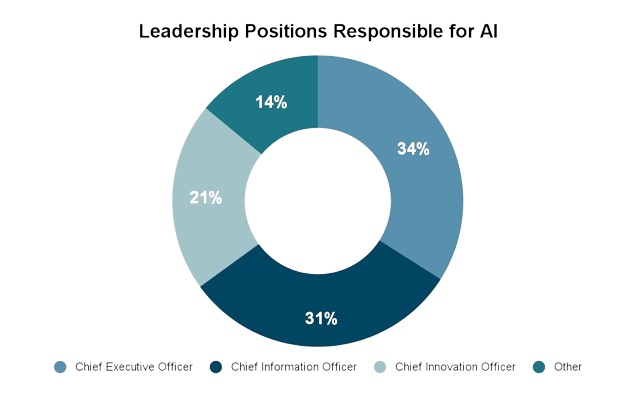
May 03, 2024
Only 31% of Chief Information Officers at large companies lead AI initiatives. Why is that?
TL;DR
- A new research study about Generative AI (GenAI) by KPMG found that 97% of business leaders from $1B+ companies are planning significant AI investments.
- About a third (34%) of these large companies have CEOs driving their AI efforts, while another third (31%) have their CIO driving AI within the enterprise, with the remaining 35% falling to leaders such as a Chief Innovation Officer, underscoring the absence of a uniform AI strategy across sectors and industries.
- Recognizing AI’s potential productivity gains, leading firms such as Accenture, Dell Technologies, and WPP have introduced a new executive position: the Chief AI Officer.
A recent KPMG study of 220 C-suite executives and business leaders of companies with annual revenues of $1 billion or more found that 97% of CEOs and business leaders plan to invest in artificial intelligence (AI) strategies during the next 12 months, with 43% anticipating spending $100 million or more. But billions of dollars being invested (collectively) into every sizable company out there begs the question: exactly what leaders will lead the implementation of these many AI initiatives?
The answer to that question reveals a good deal of conformity among companies with annual revenues of $1 billion or more. A full 86% of the C-suite executives and business leaders surveyed reported that people with only three job titles are driving their firms’ nascent but typically well-funded AI efforts. These are the Chief Executive Officer (CEO) (34%) and Chief Information Officer (CIO) (31%), followed by the Chief Innovation Officer (CINO) (21%). Only 14% of large firms have someone with a different title in charge of AI.

While the CIO, typically the most senior executive in charge of information technology (IT) within a large enterprise, makes sense as a leader to drive AI efforts, 69% of firm leaders report that someone different is in charge. A CEO leading AI efforts clearly means that it is a high priority, but will they have the time and expertise to successfully drive such efforts? On the other hand, roles like CINO or contemporary variations such as Chief Digital Officer or Chief Data Officer (or even Chief AI Officer) may, in some cases, make sense for a company; however, one of RXN Group’s partners’ client research on CINOs shows that particularly when they are new to the company and/or not also the CIO, CINOs are woefully underfunded and lack the real influence to drive change within the company. While only time will tell which of these routes, if any, is the right way to manage AI in large firms, KPMG’s survey of business leaders is an early signal that different companies are approaching the challenge in a variety of ways.
With AI at the forefront of public discourse, it is no wonder that the Chief Artificial Intelligence Officer (CAIO), responsible for deploying AI and generative AI in the workplace, is suddenly popping up all over the place (see, for example, “New Rules: Innovation, Economics, and Regulation in the Digital World,” p.6). Major organizations such as Accenture, Dell Technologies, and WPP have recently appointed CAIOs. Even Washington DC is on-trend. In March, the White House announced that the Office of Management and Budget (OMB) would designate Chief AI Officers to “coordinate the use of AI” across government agencies.
Emma O’Rourke is a Senior Research Analyst at the RXN Group.

